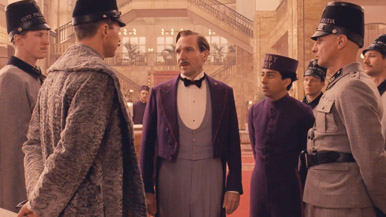The 400-Word Review: The Grand Budapest Hotel
By Sean Collier
March 24, 2014
BoxOfficeProphets.com

At the core of a narrative that takes place in four different time periods — with matching shifts in aspect ratio and color palette — is the story of M. Gustave (Ralph Fiennes), the concierge at the refined resort of the title, and Zero (Tony Revolori), his lobby boy, protege and friend. At its onset, The Grand Budapest Hotel seems to be the story of the building itself; after a twist involving Gustave’s predilection for women of advanced age, a caper involving a stolen inheritance and some infuriated heirs takes control of the script.
Anderson’s works are identified by breathtaking design; like several of his preceding efforts, every image in The Grand Budapest Hotel is beautifully constructed and shot. The impressive effect of the imagery alone will be enough to have some viewers declaring it a masterpiece, and in some ways, that isn’t far off. The ensemble cast is enchanting, highlighted (in brief) by Adrien Brody, Willem Dafoe, Jeff Goldblum, Bill Murray, Edward Norton, Saoirse Ronan, Léa Seydoux and Tilda Swinton.
It’s often howlingly funny, too, as Anderson has become equally adept at crafting jokes with his lens as he is with his pen (he is given sole screenplay credit, shares story credit with Hugo Guinness and notes inspiration in the works of Stefan Zweig). The trouble, limited though it may be, is a story that packs several layers but (arguably) may lack depth. The tale scrolls out to a fourth-hand account, sort of: in order, a girl reads a book by an author who, as a young man, heard the story from an aged Zero (F. Murray Abraham). The jumps in this structure are handled well, though they don’t necessarily add much.
That central story, though, is not structured in any familiar way. It most closely resembles a British farce, with big slapstick laughs and a tangled adventure; the film’s stated aims, though, differ from what we get. It may be that Anderson has some deliberate reason in avoiding a satisfying setup, or it may be that he doesn’t care. As rich and enjoyable as The Grand Budapest Hotel is, though, you may leave the theater feeling you missed something.
My Rating: 8/10
Aggregate Rating on CriticsChoice.com: 87/100 (Critics’ Choice Seal of Approval Recipient)
Sean Collier is the Associate Editor of Pittsburgh Magazine and a member of the Broadcast Film Critics Association. Read more from Sean at pittsburghmagazine.com/afterdark